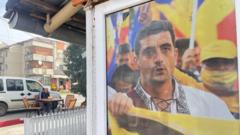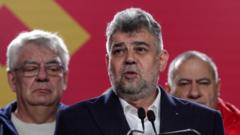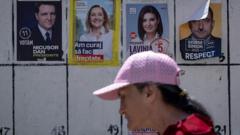In the small Romanian village of Poeni, anxiety and anger over the future of democracy are palpable as nationalist candidates gain traction ahead of elections. The political climate has been charged following the cancellation of a presidential election, raising questions about foreign influence and local economic stability amidst rising extremism and social discord.
Rising Tensions in Romania Amid Fears of Authoritarian Tendencies

Rising Tensions in Romania Amid Fears of Authoritarian Tendencies
As Romania heads towards a crucial election, the political landscape is marked by nationalist sentiments and concerns over democracy, fueled by socio-economic uncertainties.
The village of Poeni, Romania, a place with a few shops and the lively chatter of its residents, embodies a growing sentiment of fear and anger as the country approaches a pivotal election. The community has shown a surprising openness toward far-right candidates, highlighting a significant shift in political attitudes. The recent rise of nationalist politician George Simion has been met with both support and suspicion, marking a troubling trend as social and economic conditions decline.
In last November's election, far-right candidate Calin Georgescu made headlines by capturing 23% of the vote nationwide and an impressive 24% in Poeni. This election was abruptly annulled by the constitutional court, which cited that Georgescu’s online campaign had received dubious boosts from Russia, a decision that sparked outrage among his supporters, who believe their democratic rights have been undermined. Maria, a young resident of Poeni, voiced her anger, asserting that the election cancellation was unjust. Although a new vote is scheduled for May, Georgescu will not be on the ballot, prompting protests and violent confrontations with police in Bucharest.
Economic despair drives many in Poeni to support candidates who promise financial relief. Long-term residents express frustration over stagnant wages, rising prices, and unemployment that pushes the youth abroad for better prospects. Ionela, a shopkeeper, reflected on the plight of her community, conceding that while Georgescu’s policies may seem appealing, she remains unaware of his extremist past. Concerns about his connections to fascist groups are brushed aside as villagers prioritize immediate economic improvements over ideological considerations.
The implications of these elections extend beyond Romania, drawing attention from international political figures. US Vice President JD Vance recently implicated Romania in a broader discussion about the internal threats facing the EU, suggesting that the nation is under pressure from various factions, including the far-right. The perception of external meddling coupled with domestic dissatisfaction has led many to speculate about the integrity of Romanian democracy.
The uneasy atmosphere further escalates with the emergence of George Simion, who has garnered significant support but has also faced scrutiny for incendiary statements against election officials. His party, AUR, positions itself as a protector of conservative values, intertwining nationalism with cultural conservatism. However, the potential resurgence of intolerance is evident, as activists like Florin Buhuceanu, who advocates for LGBTQ+ rights, find themselves increasingly targeted amid rising anti-LGBTQ sentiment entwined with political rhetoric.
With political alliances shifting and the threats of authoritarianism looming large, many feel the need for vigilance in defending hard-won democratic rights. As tensions rise, activists warn that the struggle extends beyond political candidates and reflects a profound battle for the soul of Romania's democracy. In this charged environment, citizens must navigate the complexities of economic desire, political allegiance, and the fragility of rights in the face of rising nationalism.




















